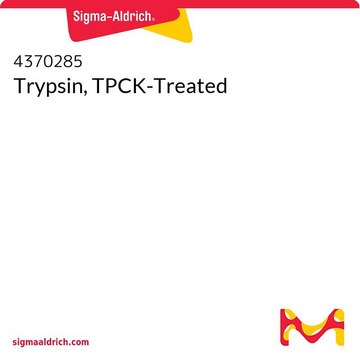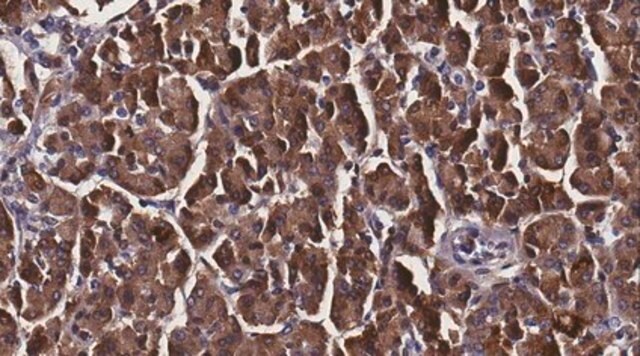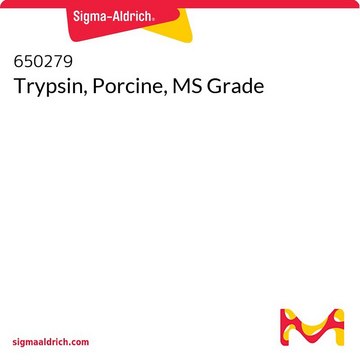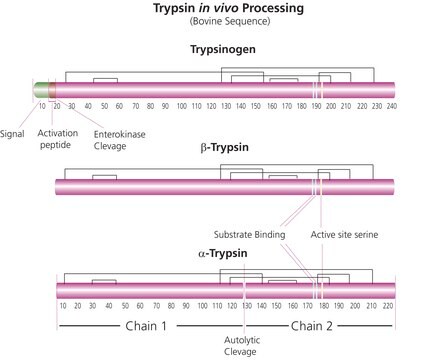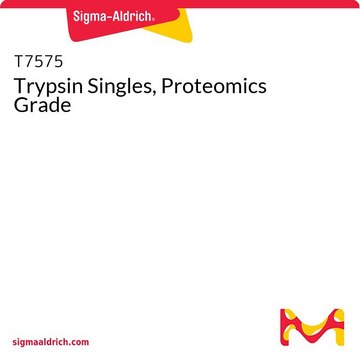MAB1482
Anti-Trypsin Antibody, human pancreas
ascites fluid, Chemicon®
Zaloguj sięWyświetlanie cen organizacyjnych i kontraktowych
About This Item
Kod UNSPSC:
12352203
eCl@ss:
32160702
NACRES:
NA.41
Polecane produkty
pochodzenie biologiczne
mouse
forma przeciwciała
ascites fluid
rodzaj przeciwciała
primary antibodies
klon
monoclonal
reaktywność gatunkowa
human
producent / nazwa handlowa
Chemicon®
metody
ELISA: suitable
izotyp
IgG2b
numer dostępu NCBI
numer dostępu UniProt
Warunki transportu
dry ice
docelowa modyfikacja potranslacyjna
unmodified
informacje o genach
human ... PRSS1(5644)
Specyficzność
Recognizes trypsin -1
Immunogen
Epitope: human pancreas
Purified human pancreatic trypsin.
Zastosowanie
Anti-Trypsin Antibody, human pancreas detects level of Trypsin & has been published & validated for use in ELISA.
Immunohistochestry/IH(P): {Solakidi, et al. 2003} 1:100-1:500; formalin fixed, paraffin embedded human tissues; 5μm serial sections; blocking solution 0.5% serum in PBS; overnight incubations; enzymatic detection.
ELISA at 1:25,600.
ELISA at 1:25,600.
Research Category
Metabolism
Metabolism
Research Sub Category
Enzymes & Biochemistry
Enzymes & Biochemistry
Przechowywanie i stabilność
Maintain at -20°C in convenient aliquots for up to 12 months. Avoid repeated freeze/thaw cycles.
Informacje prawne
CHEMICON is a registered trademark of Merck KGaA, Darmstadt, Germany
Oświadczenie o zrzeczeniu się odpowiedzialności
Unless otherwise stated in our catalog or other company documentation accompanying the product(s), our products are intended for research use only and are not to be used for any other purpose, which includes but is not limited to, unauthorized commercial uses, in vitro diagnostic uses, ex vivo or in vivo therapeutic uses or any type of consumption or application to humans or animals.
This page may contain text that has been machine translated.
Nie możesz znaleźć właściwego produktu?
Wypróbuj nasz Narzędzie selektora produktów.
Kod klasy składowania
10 - Combustible liquids
Klasa zagrożenia wodnego (WGK)
WGK 1
Temperatura zapłonu (°F)
Not applicable
Temperatura zapłonu (°C)
Not applicable
Certyfikaty analizy (CoA)
Poszukaj Certyfikaty analizy (CoA), wpisując numer partii/serii produktów. Numery serii i partii można znaleźć na etykiecie produktu po słowach „seria” lub „partia”.
Masz już ten produkt?
Dokumenty związane z niedawno zakupionymi produktami zostały zamieszczone w Bibliotece dokumentów.
Patrycja J Puiman et al.
Pediatric research, 69(3), 217-223 (2011-03-05)
Paneth cell dysfunction has been suggested in necrotizing enterocolitis (NEC). The aim of this study was to i) study Paneth cell presence, protein expression, and developmental changes in preterm infants with NEC and ii) determine Paneth cell products and antimicrobial
Experience with an automated microwave-assisted rapid tissue processing method: validation of histologic quality and impact on the timeliness of diagnostic surgical pathology.
Morales, AR; Nassiri, M; Kanhoush, R; Vincek, V; Nadji, M
American Journal of Clinical Pathology null
Proinflammatory and proliferative responses of human proximal tubule cells to PAR-2 activation.
Vesey, DA; Kruger, WA; Poronnik, P; Gobe, GC; Johnson, DW
American Journal of Physiology: Renal Physiology null
Yuria Egusa et al.
Diagnostics (Basel, Switzerland), 11(12) (2021-12-25)
Secretory carcinoma is a salivary gland neoplasm first described as a mammary analogue secretory carcinoma by Skalova and redesignated as a secretory carcinoma in the 2017 World Health Organization Classification of Head and Neck Tumors. Secretory carcinoma diagnosis is reliant
Selja Koskensalo et al.
Oncology, 82(4), 234-241 (2012-04-18)
The tumour-associated trypsin inhibitor TATI is expressed together with trypsin in many cancer forms, and an elevated serum level associates with poor prognosis. TATI can reduce tissue destruction by inhibiting trypsin and other proteinases, and in some cancer forms, its
Nasz zespół naukowców ma doświadczenie we wszystkich obszarach badań, w tym w naukach przyrodniczych, materiałoznawstwie, syntezie chemicznej, chromatografii, analityce i wielu innych dziedzinach.
Skontaktuj się z zespołem ds. pomocy technicznej
